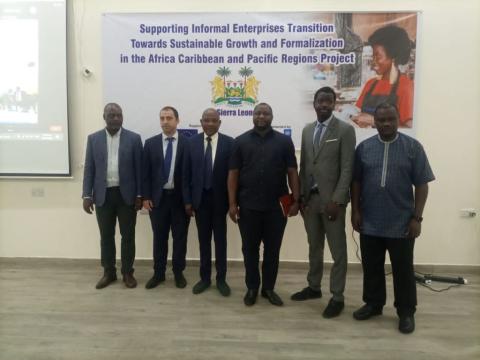By Abass Jalloh
The United Nations Development Programme (UNDP) and the International Labour Organization (ILO) together with the Government of Sierra Leone have discussed policies for a project that could help transform Small and Medium Enterprises (SMEs) into the formal sector in the country.
On Friday 22nd July 2022 at the Brookfields Hotel in Freetown, the project partners, representatives from the government and stakeholders hosted a workshop to validate a prepared baseline report and work plan for Sierra Leone before the commencement of the project.
According to the report presented as a proposed work plan, globally the project to last four years will target six countries namely Central African Republic, Mozambique, Sierra Leone, Sudan, Haiti, and Solomon Islands.
The report’s key objectives include engaging key stakeholders by mobilizing members of a steering committee that would be able to identify local challenges and opportunities for formalising the operations of SMEs.
The informal sector in Sierra Leone accounts for over 50% of economic activities, similar to nations in Sub-Saharan Africa, where the informal economy averages from 50 to 80 percent, the report says.
The low productivity in the sector has been a major determinant of the limited income generation capacity of the overall national economy. “This outlook is accompanied by income poverty of close to 60 percent for the country, measuring more than 70 percent in the rural communities,” the report said.
Drivers of these informal businesses in Sierra Leone encounter weak policies to transform into formal enterprises, coupled with complexities of the legal system, prevalent preferential treatment in the application of policies and regulatory framework, insufficient investment capital, and lack of access to loans.
Minister of Trade and Industry, Dr. Edward Hinga Sandy said they as a government are looking at what they can do in terms of policies and legislation to support the SMEs, especially those dealing in local products.
“We know the informal sector is mainly dominated by the economic sector; that is why even when we come to talk about trade in Sierra Leone and other African countries it is mostly the informal sector and enterprises that are involved in such trade but the numbers are always low,” Dr. Sandy said.
The minister said the programme was going to look at some of the legal policy frameworks that needed strengthening to make it easier to roll out the programme.
He said his ministry would try to bring together all these agencies or institutions that are supporting SMEs.
The Programme Officer in the Private Sector Development and Trade Department at the European Union (EU), Nikola Kutin spoke about the EU fund that he said has been implemented at the global level.
He said the project could benefit all through an exchange of good practices between the selected countries in order to help formalize the economy.
“The project will focus on updating and supporting the authorities to update the regulatory framework to make it easier for companies to register to become formalized; when it becomes formalized you have easier access to finance and credit and be traceable by the financial institutions,” Kutin said.
“Informal companies should also have access to skills and training and to also select one area that would be a kind of a platform for dialogue between different stakeholders in order to come up with solutions to formalize the economy,” he added.
The UNDP Resident Representative, Lamin Beyai stated that the organisation has been finding new development strategies and initiatives in Sierra Leone that would promote sustainable development.
He noted that targeting the informal sector provides the opportunity to identify challenges in the financing of especially local goods and services and look at initiatives that would strengthen the market.
Copyright © 2022 Politico Online (25/07/22)








